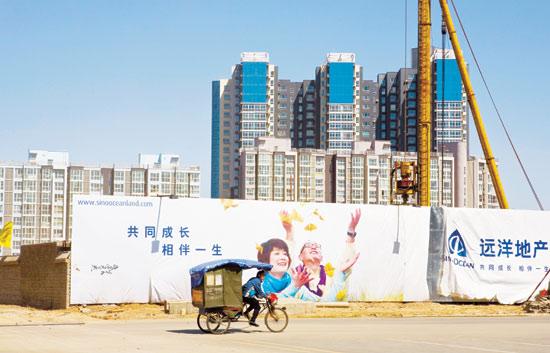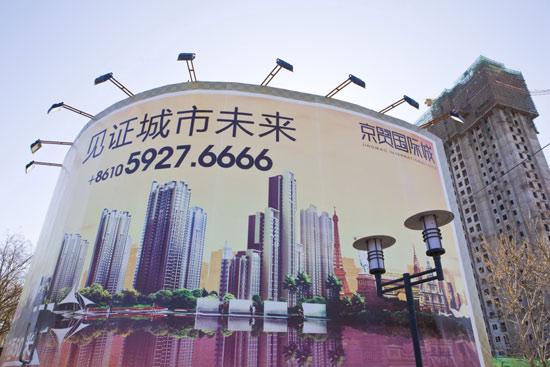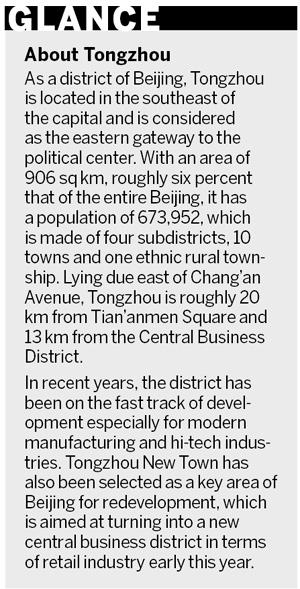 A rickshaw passes by recently built skyscrapers at Tongzhou New Town. Tongzhou has been earmarked by the city to become a world-class satellite town. WANG HENG / FOR CHINA DAILY
A rickshaw passes by recently built skyscrapers at Tongzhou New Town. Tongzhou has been earmarked by the city to become a world-class satellite town. WANG HENG / FOR CHINA DAILY
Some of the world's top retailers are joining the rush to start operating in Tongzhou district, which has been dubbed Beijing's Manhattan by local media.
The fast-growing Tongzhou, 20 km east of Tian'anmen square and 13 km from the CBD, has been earmarked by the city to become a world-class satellite town.
It is similar in role and water resources to New York's Manhattan and there are plans to turn it into a modern business, consumption and cultural center in Beijing,
Plans released by the city's municipal government said Tongzhou will have several water features. The area has 13 rivers, with a total length of 245 km, including the north end of Beijing-Hangzhou Grand Canal.
Cranes and bulldozers are busy, with international commercial real estate dealers and more than 50 enterprises expressing a strong desire to move in.
Aside from domestic companies such as COFCO Commercial Property Investment Co, which has opened two Joy City shopping malls in central Beijing, Japan's Aeon Mall, Thailand's Central Department Store and Wal-Mart of the United States are all planning to operate stores in Tongzhou.
"Tongzhou new town has great potential, because it has many superior conditions," said Tetsuji Nisiot, managing director of Aeon Mall China Business Management Co.
Nisiot said Tongzhou has good transport, is close to the CBD and has many residential projects under construction.
"In the near future, there will be a big population living in Tongzhou, which naturally demands nice shopping centers," Tetsuji said during a commercial property promotion fair held by Tongzhou Commission of Commerce late last month. "Aeon Mall, as the largest shopping center operator in Japan, really wants to develop a project in this precious land. We hope the local government can lend a hand to us."
He said that from 2000 till now, many people in Japan moved to suburban areas, increasing the demand not only for shopping, but for leisure centers.
 The planning map of Tongzhou New Town is highly visible in Tongzhou.
The planning map of Tongzhou New Town is highly visible in Tongzhou. "During the past 10 years, shopping centers in Japan had been on the fast track to development to meet this growing demand. Similarly, I think Beijing has also entered into a good development period, too."
Aeon Mall already operates one store, which it opened in Changping district in 2008. It's got the jump on other foreign operators because the others are still finding ways to make their presence felt in the capital.
Chen Ancheng, business development director of Thailand's Central Department Store, said his company missed earlier opportunities to set up stores in Beijing.
"But we cannot give up the Beijing market. We are now eyeing suburb districts of the capital, such as Tongzhou, Shunyi and Daxing," Chen said.

Chen said that following thorough research on Tongzhou, the company has given the area high priority.
"We are confident of Tongzhou's prospects and are looking for a good location to develop our business."
RT-Mart, a Taiwan-based supermarket that owns 127 stores in China, said it would not need any form of preferential policies from the Tongzhou government, if it gets the green light to operate in the area.
"We welcome competitors to open stores in the neighborhood, because we are confident of our operations," said Hong Wankang, business development director of RT-Mart.
"Of course, competition brings pressure, but I've told our managers that when competition comes, you will not doze off and you will be inspired."
Hong told Tongzhou leaders at the fair that his company has always been socially responsible.
"The Guanghua School of Management at Peking University was founded by our company," he said. "We established three funds for the humanities in three different renowned universities.
"We have a good corporate culture. We will do our best to make contributions to new town construction."
Cui Zhicheng, deputy governor of Tongzhou district, said domestic enterprises such as Dalian Wanda Commercial Properties Co, Intime Department Store (Group) Co and Greenland Group have contacted officials to discuss business projects.
But some industry insiders are concerned Tongzhou should ensure that the right companies are selected to operate there.
Wang Yongping, deputy director of China Commercial Real Estate Association, said Tongzhou should bring in "proper companies" to develop commercial projects, instead of just using companies because they are famous, have a large base or have an overseas background.
"Commercial properties are different from residential projects," Wang said. "Some companies may be good at building apartments or villas, but may not be a good commercial property developer.
He also said the government should insist on high-quality commercial properties, rather than allow as many commercial real estate projects as possible.





